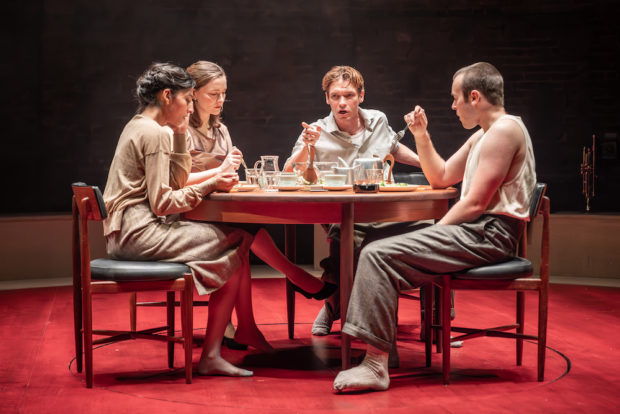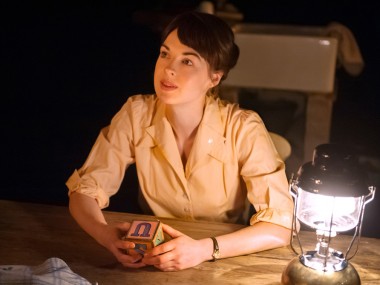Angry and Young, Almeida Theatre
Saturday 5th October 2024

Why should we not look back in anger? Surely the recent past is as broken as our miserable present. With the Oasis reunion tour still in the news, the title of John Osborne’s seminal kitchen-sink drama — which kicked off the whole cultural phenomenon of the Angry Young Men on its first Royal Court staging in 1956 — has again become familiar, in its reminted version, to a new generation. Now the original Look Back in Anger gets an overdue revival along with Arnold Wesker’s equally classic Roots (1958) at the Almeida Theatre, packaged as a mini-season called Young and Angry, with a shared cast led by Morfydd Clark and Billy Howle. But can these 1950s expressions of rage, whose verbal fireworks and tone of fury changed postwar British theatre forever, resound anew today?
The two plays are family dramas. Osborne’s Look Back in Anger, set in a large Midland town, is about the marriage of working-class Jimmy and upper-class Alison, while Wesker’s Roots (second in his trilogy about the Jewish working-class Kahns that starts with Chicken Soup with Barley and ends with I’m Talking About Jerusalem) is about rural working-class Beatie and her Norfolk family, especially her mother. In both plays it’s the men, Jimmy and Beattie’s offstage boyfriend Ronnie Kahn, that are pictured trying to change the lives of their female lovers, Alison and Beatie: they want them to be more alive, more questioning, more engaged.
As everyone knows, Jimmy comes across as a bully, and his marriage to Alison is toxic, a kind of sado-masochistic relationship that then, like now, is perhaps not as rare as one might hope. It’s uncomfortable to watch, but emotionally realistic. Jimmy says out loud when many men think, but are inhibited from saying. And his views about women were pretty offensive even in the 1950s. When I did some interviews with original audience members of the play’s first production, for my 2008 book on John Osborne’s Look Back in Anger, one of them, Jacqueline Glasser, told me: “I didn’t like the way Alison was treated”, but then also added, “I felt she should learn to stand up for herself.” Which, in the text, she does. Occasionally. As does Beatie in Wesker’s Roots. Even more so.
Alison’s weapon is silence. Her passive aggression is, as she tells her friend Helena, entirely deliberate. But there’s no point in taking sides in this portrait of a difficult marriage — both Jimmy and Alison are right, and wrong. What’s exciting theatrically is Osborne’s truthfulness in depicting masculinist attitudes which are as prevalent today as they were some 70 years ago. Yes, Jimmy rants; yes, he’s unbearable (we have all surely met his type); yes, his opinions are disagreeable. But, boy, does he light up the stage. He certainly has, as Alison’s dad perceives, a way with words. If Alison struggles to find a way to stand up for herself, Wesker’s Beatie does too: after parroting the views of Ronnie for days, she finally finds her own voice. Even if that voice sounds very like her lover’s.
Both Look Back in Anger and Roots are semi-autobiographical: Osborne was describing his failed marriage to actor Pamela Lane, who was more successful than him, and Wesker based Beatie on his wife Doreen Bicker, who he nicknamed “Dusty”. But beyond the details of the dramas’ personal relationships, which today still come across as intense and alive, the plays also share ideas that likewise are still relevant: both are about masculinity as domination, femininity as self-denial, both are about sex, both are about death, both are about class, both mention nuclear weapons, both view commercialised mass culture with anxiety, both advocate in favour of working people and against the ruling class. At several moments you can feel today’s Almeida audience nod in agreement.
This mini-season’s directors — Atri Banerjee for Look Back in Anger and Diyan Zora for Roots — have agreed to use a bare circular crimson stage, designed by Naomi Dawson, plus a handful of props, and with Tomás Palmer’s costumes suggesting present casual wear as well as that of the past. This removes the action from the world of period drama and foregrounds the writing, which often seems thrillingly contemporary in both its putdowns (such as “bitch”) and its moments of yearning lyricism (Beatie as well as Jimmy longs for a better future). Banerjee has trimmed the text slightly (cutting out the mention of “some dirty old Arab” and a few of the gay references) and his Helena refrains from kissing Jimmy after slapping his face.
Still, the casting is excellent: Billy Howle as the working-class, university-educated Jimmy is an exciting stage presence, whose range confidently spans provocation, exasperation, rage, and moments of thoughtfulness, pain and tenderness. Opposite him is Ellora Torchia’s upper-class Alison, who could have made more of her silent antagonism in the first act but gradually finds both the necessary depth of intensity and the necessary despair. Because of the actor’s South-Asian heritage, the dialogue’s lines about India and nostalgia for imperialism (which Jimmy and Alison’s father to some extent share) come across more powerfully than ever. At another moment, when Banerjee has Helena enter early to overhear Jimmy compare her unfavourably to Cliff, is very effective.
Zora’s Roots gives the stage a gentle revolve and effectively highlights the acting, sharing cast members across the double bill: Morfydd Clark, who is a bit uncomfortable as Helena in the other play, here shines luminously as Beatie, convincingly portraying the absent daughter who returns to her family determined to change their minds. If the moments when she quotes Ronnie are unnecessarily spotlighted, and her final self-revelation presented much too cinematically, her relationship with her mother (Sophie Stanton) is keenly felt and keenly fraught. Iwan Evans, who as Cliff is an excellent foil to Jimmy in the Osborne, makes a small appearance in the Wesker as boss Healey, while Deka Walmsley’s father is neatly truculent, just as his Colonel Redfern is stolidly military. Tony Turner’s Stan Mann, a local alcoholic, is touchingly distressed, and Eliot Salt is similarly right for Jenny, Beatie’s sister.
Rupert Goold, artistic director at this venue, has done a great job in programming this pairing of two such significant, if now rather rarely performed, modern classics. While I could have done without some of the directorial excesses — the ash fall at the end of Look Back in Anger or Alison’s glass crushing or the overly dramatic soundtrack by Peter Rice and George Dennis — in general this double bill has a youthful energy, a vigorous life that illuminates both works, and provides that rare thing: plenty of material to talk about, to disagree with and to assess. Okay, I know the original Angry Young Men have all departed, but their provocation remains. In today’s theatre, rage may have cooled, but surely the political need for it is greater than ever. So where are today’s new young angries?
This review first appeared on The Arts Desk


